- Home
- Adrienne Kress
Dreams Come to Life Page 5
Dreams Come to Life Read online
Page 5
“I know what?” she asked, turning a corner. I followed her. She flipped a switch and a few dusty lightbulbs that ran along the narrow ceiling flickered to life.
“I’m not … used to seeing so many women doing … this kind of work.” It was hard expressing what I wanted to say. Mostly because, I guess, I wasn’t really sure what I was asking.
“Okay, okay, before you tie yourself into a knot, string bean, let me help you.” Dot stopped walking and turned to face me, and I faced her back. “During the war, Mister Drew, like every other employer, lost a lot of his staff to fight the good fight. So like a lot of other companies, he hired us ‘ladies,’ as you put it. War finishes, not all the boys come back, and those that do, well … Mister Drew liked our work. I think it surprised him at first, but then he realized he’d been ignoring a lot of talent without realizing it. Mister Drew likes talent. He doesn’t care what gender or age or color or class it comes in.”
“Yeah.” I nodded, thinking about my interview with him. Not that Mister Drew actually knew if I had any skills. I hadn’t drawn so much as a circle yet. Odd, when I thought about it that way.
“Anyway, you get it. The guys who came back, came back. But Mister Drew didn’t fire any of us gals. We worked together for a while, some of the men stuck around, others didn’t much like being bossed around by women, so … we end up where we end up.”
“With lady bosses.” I got it now.
“Just bosses, Buddy. Women aren’t some strange special boss breed. Just people, Buddy, just people.” I nodded again. I mean, I knew that. I did. Dot looked at me for a moment. “You’re going to have to toss that whole outfit. It’s destroyed.”
I looked down again at the black ink soaking through my shirt. “Yeah,” I said. I didn’t want to think about it. That left me with only one other good outfit of a shirt and trousers.
Dot gave a sharp nod and started walking again. I did too. She walked quickly, but her every two strides were one of mine, so I didn’t exactly feel rushed. Even though I sort of knew that I should be getting back to work. It was nice to have something make some kind of sense. It was nice to have a friend. Was she my friend? I wasn’t sure.
We finally stopped in front of a closed door. Dot glanced around then, and that definitely made me think what we were doing was not allowed. She pulled out a small brass key from within a deep pocket in her skirt and unlocked the door.
“Where’d you get that?”
Another shrug.
She opened the door, turned on the light, and we stepped inside.
It was another storage room. But much bigger than the others we’d passed, which had been barely bigger than a closet. That being said, so much was piled up along all four walls that it gave the impression the space was much smaller than it was. In the middle were a couple of chairs and a table. And what looked like a buncha those little dollhouses you’d see in the toy shop windows were laid out on the desk. My shoulder caught against something sticking out, and I turned to look at it. It was a wheel.
A wheel?
That was when everything finally came into focus.
It’s interesting how the brain works. It can see all the things as one thing. It doesn’t see the pieces, the individual component parts. You see a car. You don’t see a windshield, doors, headlights. You see those second. After you’ve seen “car.”
It’s funny how, if you don’t look for the pieces, sometimes you never notice them.
The small individual things that make up the whole.
The clues.
The point was that I’d just seen “stuff.” But now that I noticed the wheel, I noticed more. I noticed the wheel was attached to a small-looking cart, and I realized it was a lot like the bumper cars at Coney Island. And then I realized that this wall was made of a stack of cars. And more than just that, there was a sign half-hidden with lightbulbs around it. I could read “DY Bumpers” on it. I walked into the room and turned in a circle, and noticed more things. Like a black-and-white carousel horse and a cutout of Boris the Wolf holding a platter with the word “Food” and an arrow.
“Amazing, isn’t it?” asked Dot.
I turned and saw she was standing by the table.
“What is all this?”
“Well, let me show you,” she said, pointing at the little dollhouses.
I joined her at the table and realized then that they weren’t dollhouses at all. They were part of a small-scale model, which made a lot more sense. We both leaned down on either side of the table. I briefly glanced up, and the way Dot’s nose and mouth disappeared behind a small model of a building, it looked like she was a giant watching a human flea circus.
I glanced back down. I was hovering just above a tiny sign that read “Bendy Bumpers.” I peeked over my shoulder at the real thing, hidden now in the shadows. “I don’t get it. Coney Island?” I asked.
“Bendyland,” she replied.
I looked up at her and she was looking at me with this kind of knowing look.
“Does this exist?” I asked. But even as I did, I knew the answer. It couldn’t, because all this junk was in this room. “Did it exist?”
She shook her head no. “It’s Mister Drew’s next big project. Been working on it for the last couple years, or at least for as long as I’ve worked here. But always in secret. Nobody knows about this place, not that I’ve seen. It used to be just bits and pieces and the model would grow and grow. But then last month, this room started really filling up. Like something is about to happen.”
I thought about that man Tom I’d seen yesterday. I thought about the cardboard tube in his hand. The kind of tube that architects and designers carry. Maybe he was working on this.
“I don’t know where he’s going to store everything because even this warehouse is tiny. Crazy, isn’t it?”
I took in the whole scene of the model before me. There were rides and a midway with little booths hosting little games. There was a food area, and even something that looked like a haunted house. It was a whole park. Just for Bendy stuff.
“Mister Drew came up with all this?” I asked in awe.
“Who else?” asked Dot.
“And you don’t think anyone else knows?”
“I don’t think so.” Dot stood upright and crossed her arms over her chest, still looking at the model. I stood up too.
“How do you know about this?” I asked.
“Good question, Buddy.” She seemed impressed. “Keep asking questions like those here. It’s important.”
I didn’t understand. I mean, I understood what she’d said, I just didn’t understand why she’d said it. So I asked. Since, you know, that’s what she’d told me to do anyway. “Why?”
“I don’t know, Buddy, I don’t. I just feel something in my gut and it doesn’t feel good. I need to understand it better. I like information. I like details.”
Ma used to say the devil’s in the details.
“Anyway, don’t get distracted, Buddy. You asked me a question and look what I did. I didn’t answer it, and we moved on to something else.”
I nodded. I was confused, except I wasn’t. Which was also confusing.
“So how do you know about this?”
“I sneak around. I want to collect facts.”
“’Cause of the gut thing.”
“Yeah.”
I understood sneaking. I’d done it a lot in my neighborhood. And when I’d spied on the artists in Central Park.
“Where’d you get the key?” I asked.
Dot smiled at that. “Even better question.”
“Thanks.”
“Wally’s always losing his keys. Doesn’t mean I gotta return them.”
I nodded again, not sure how I felt about the whole stealing thing. Well, I knew how I felt and I didn’t like it, but I liked Dot and she seemed so sure of herself, like she always knew the right thing to do. Maybe the right thing this time was the wrong thing somehow?
“We should probably get back upstairs bef
ore they notice we’re missing,” she said. I felt a flash of panic thinking about being late and getting fired, though at the same time, I’d been missing for a pretty long time already and no one really had seemed to care. Then again, no one really knew I worked here. Yet.
“Could you help me find my way back to the Art Department?” I asked as we locked the door behind us and made our way toward the elevator.
“Of course.”
I stopped then. Thinking. Dot stopped too. Noticing.
“What is it?” she asked.
“Why me?” I asked.
“Why you what?”
“Why did you come to find me? Why did you show me all this?”
She squinted at me then with that look. You have that look, you know, Dot? That look that says I should figure this out somehow myself, that I have the key, the solution.
I didn’t. I didn’t then, I don’t now. You put too much faith in me, Dot.
“My gut,” she replied.
I didn’t see Mister Drew at all that day. That made me feel a little bad. A little worried even that he hadn’t really meant his job offer, or that he’d forgot all about me already. When I made it back to the Art Department, though, it seemed like a giant spotlight was shining down on me. I was definitely not invisible anymore.
“When they say throw yourself into the work, they don’t mean actually.”
“Is this some conceptual art piece?”
“You wanna be a cartoon character when you grow up?”
I think there were other things the gang in the Art Department said, but I can’t remember. I remember them laughing. I remember my face getting hot. And I remember just trying to get the little odd jobs everyone asked of me done as quickly as I could with as little conversation as possible until the end of the workday.
The clocked ticked on. Five o’clock. Six o’clock. I was more than ready to go. So much for day one of the dream job. But no one told me when the day was done and no one around me got up. All the heads stayed bent over their desks, their pencils furiously scratching at their papers.
“It’s okay, Buddy, you can go,” said Ms. Lambert. I jumped a bit—she had kind of snuck up on me.
“I can stay,” I said. I didn’t want to look lazy. I was a hard worker.
“It’s okay. Everyone’s pushing toward a deadline, and this is your first day. Besides, it looks like it wasn’t exactly an easy one.” She grinned at me.
I didn’t know what to say or do, and I kind of did just want to run away. The thought of going outside covered in ink like this really didn’t make me feel great. But I did as she said and grabbed my jacket and made my way home. I stayed very focused on the sidewalk beneath my feet. Wasn’t in the mood to catch folks staring at me.
It was harder to ignore the shouts from the people in my neighborhood.
“Hey, Buddy! You fall into a vat of chocolate there?”
That kind of thing.
I made it home and dashed up the stairs, knocking into Mr. McKenna coming out of the bathroom, that tired old towel wrapped around his waist, his belly bulging over it.
“Watch it, kid!”
I burst into the apartment and flew past Ma cleaning dishes in the kitchen and into my room. I came to a short stop. I’d forgotten.
My grandfather.
He was standing in the small space between the foot of the bed and the wall, staring at the oversized painting hanging there. I suppose the painting itself wasn’t oversized, it was the size it was. It just was really big compared to the wall, and it dominated the room, I’d always thought.
“Just need to change my shirt,” I announced. But he didn’t move or even make any kind of sign he’d heard me. Not even a grunt. “Koszula,” I said. My Polish was terrible, I only knew dribs and drabs. I wasn’t even sure how I knew the Polish word for “shirt” in the first place.
Telling him that didn’t seem to do anything either.
So I edged my way up to him, trying to get him to notice me. When he didn’t, I finally just climbed over the bed in order to get at my dresser. I glanced up at the painting as I went by. It was a nature scene, with a mountain and trees. It wasn’t really painted realistically like a photograph, more like the artist had slapped paint on thickly and had accidentally come up with the picture. I was so used to it, so familiar with every shape and every line. But I was familiar with more than the picture itself. There was also the heavy gold frame. When I’d been little, I’d asked Ma if it was real gold. It wasn’t, she said. I’d said if it was real gold, we could have sold it and gotten a new apartment. And also more food. She had smiled. “The frame isn’t what’s valuable.”
I didn’t get what she meant then. But I did a few years later when Tommy Sharp told me he’d seen in the paper that a painting that looked a lot like one of ours had sold for ten thousand dollars at an auction. I didn’t believe him, and we’d gotten into a fight about it. But I’d gone home all bruised and looked at it. And it was like my whole world had come into focus then. I noticed the other paintings in the apartment. The ones stacked above each other against the length of the hall. I noticed how they took up space all the way to the ceiling, almost like they were being stored. They were all crooked. Dusty. I’d lived with them for so long I hadn’t noticed that the paintings were something to notice.
“Ma, we could sell these paintings,” I’d said. “We could have money. You could stop working yourself to death for Mr. Schwartz every day.”
“What ideas you have,” she said with a laugh, getting up from the table and ruffling my hair like I was still a little kid and not thirteen.
“Money’s important, Ma,” I said, turning in my seat to watch her.
“Don’t tell me money’s important like this is not something I know.” She leaned against the sink and looked at me. “We aren’t selling the paintings.”
“They have value. You even told me that once,” I said. “Did you see the paper?”
“No.” She turned back to the sink. But she didn’t do anything. She just stood there. Silently. Tears don’t make noise. People think they do because when people sob and stuff they make sounds with their throat, but actually you can cry and no one will know.
But I knew. I always knew.
What I didn’t understand was why she was crying. My heart sank into my stomach.
“Is it about Pa?” I asked quietly. We hadn’t had a letter from him in weeks.
She turned abruptly, her eyes wide and red. She seemed scared, but not in a way I can really explain. I bet you could, Dot. Then suddenly her expression softened and she said, “Oh, your pa. No, no, it’s not about him.”
I looked at my grandfather as I made it to the dresser and opened my drawer.
It suddenly clicked in, that memory. “Is it about Pa?” She’d thought I’d been asking about her pa, not mine. She’d always been hiding something there. About her family.
What was he seeing in the painting? Why did it matter? What was I missing?
I pulled out my shirt and grabbed my other pair of trousers and slammed the drawer closed. It wasn’t fair, I didn’t need this. I didn’t need some mysterious old man who didn’t speak English in my room, in my space, making everything complicated. I didn’t like how he made Ma sad either. She was always so happy except when she talked about him. Why was she letting him into her life like this? Our life like this?
Why was he standing way too close to that painting?
It was all too much. Today had been just too much.
I stomped my way across the bed again, which isn’t actually a thing you can do. It’s more like you kind of trip angrily and fall off the other side. And I was back in our narrow hall. I stripped and changed my clothes and flung the inky ones onto the bed.
My grandfather didn’t flinch.
He just stared.
And kept staring.
Working at the studio was not at all what I thought it was going to be. I mean, it wasn’t bad. Anything was better than being a delivery guy for
Mr. Schwartz, outside in the heat of a New York summer. That being said, I’m not so sure I would have chosen being a delivery guy inside in the heat of a New York summer either. Especially in a stuffy, airless animation studio.
That’s not to say that there weren’t some advantages. Watching the artists at work was a huge one, of course, when they let me. Jacob always allowed me to glance over his shoulder a bit, but Richie, nah, he hid his work from me like he was writing secret messages to the Allies during the war. Also honestly being able to tell people from the neighborhood I was working uptown for Joey Drew Studios was pretty great too. They were impressed. They were jealous.
And the folks I met at work were pretty swell too. Most of them. Ms. Lambert, who ran the Art Department, was a bit severe, and sometimes frustrated me when she told me to sit down at my desk and stop hovering all the time. She also wore men’s suits, which I found fascinating and definitely an inspiration for some kind of character I figured I would create. Someday. When she finally allowed me to draw. Which couldn’t come soon enough. I wanted to learn, I wanted to be part of the group. Then there was the rest of the team. Richie, Dave, and Jacob, who I’d met that first day. They were like this little gang almost. Their desks sat in a row along the wall under three bright lights. Richie and Jacob looked to be in their twenties and were full of energy. Richie was rough around the edges and always reeked of cigarette smoke. The tips of his fingers were even yellow, which I learned when he passed me some new sketches, looking over the top of his small round glasses at me with suspicion. His clothes always looked a bit wrinkled, and that made me feel better since, after the Sammy incident, I now had only one set of shirt and trousers to my name. Didn’t even have a suit jacket.
Jacob, on the other hand, was a snappy dresser with brightly colored ties and matching socks. I didn’t even know they made socks in colors other than black and white. Sometimes he’d even wear his hat indoors. He seemed okay enough, though he was the one who teased me the most. He couldn’t seem to let go of the whole me-being-covered-in-ink thing. At least when he brought it up he smiled. The fact was he teased everyone, so I tried not to take it personally.

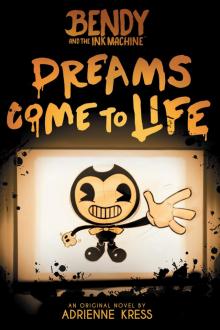 Dreams Come to Life
Dreams Come to Life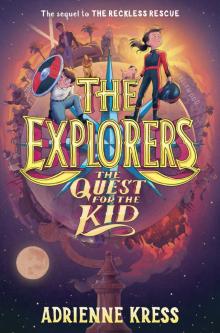 The Quest for the Kid
The Quest for the Kid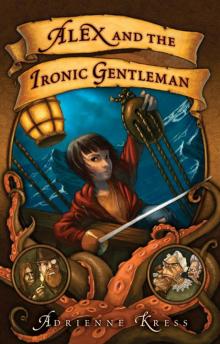 Alex and the Ironic Gentleman
Alex and the Ironic Gentleman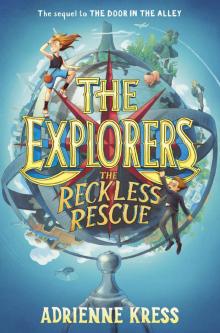 The Reckless Rescue
The Reckless Rescue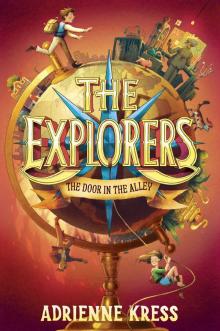 The Door in the Alley
The Door in the Alley Outcast
Outcast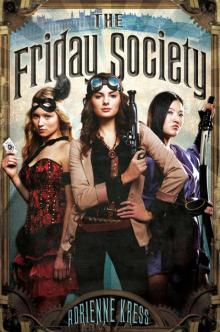 The Friday Society
The Friday Society